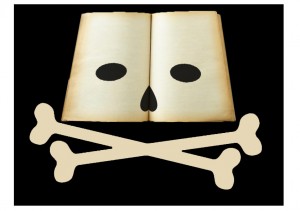No pirate´s life for us
 Yesterday I was looking around in the River Island. I saw this amazing t-shirt which I desperately wanted to have. However, since DUO-payday hasn’t taken place yet, I couldn’t buy the shirt. In the evening I wanted to see a movie so I grabbed my laptop and downloaded one. Both a t-shirt designer and a movie producer put money in the production. Then why do I illegally download a movie but won’t it occur to me to steal a t-shirt?
Yesterday I was looking around in the River Island. I saw this amazing t-shirt which I desperately wanted to have. However, since DUO-payday hasn’t taken place yet, I couldn’t buy the shirt. In the evening I wanted to see a movie so I grabbed my laptop and downloaded one. Both a t-shirt designer and a movie producer put money in the production. Then why do I illegally download a movie but won’t it occur to me to steal a t-shirt?
This question has to do with piracy. Wherever shoplifting is considered illegal by everyone, there are people who think piracy should be made legal because it provides innovation, monopoly breakdown and access to knowledge for everyone. Someone who’s pro piracy is Christopher Kelty. He quotes:
The world, it should not come as a surprise, is filled with people who want desperately to learn. This is what our world should be filled with. This is what scholars work hard to create: a world of reading, learning, thinking and scholarship. The users of library.nu were would-be scholars: those in the outer atmosphere of learning who wanted to know, argue, dispute, experiment and write just as those in the universities do.
What Kelty says in his piece is how piracy provides access to scholarly publications for everyone. His ideas are noble and I agree with him. People from all over the world should have access to scientific knowledge. However, the movement of Open Access is already taking care of this. Open access to scholarly publication is no more than normal, since it’s often the tax payer who pays for the research. It’ll take some time till the whole system is being reformed, but eventually it will be ready. And it’s done in a non-illegal way. When pirates now put things online, they upset the Open Access system. It’s better to keep clear the system so it doesn’t end up in a clutter.
It was piracy which started Open Access and forced large publishers to change the system. And it was piracy which opened up music industry (see this and this). So it’s true that piracy provides innovation, breaks down monopolies and opens up access to knowledge. Liang quotes it like this:
When we subject the material operation of piracy and its social consequences to scrutiny, it becomes clear that pirate infrastructure is a powerful mediating force that produces new modes of organizing sensory perception, time, space, and economic networks. Doing so also forces us to acknowledge the material linkages between content and infrastructure. One of the significant approaches used by scholars of the public domain is an emphasis on the ability to create new content building on existing works.
Piracy opened up established systems. Some industries were able to adapt new ways of making money. Music industry, for instance, and scholarly publishing. In music industry artists can make money by merchandise and doing concerts. In scholarly book industry the system is turned around with the author paying for publishing instead of the subscriber, or the author pre-publishing for free. But in trade book industry and film industry there are less other ways to earn money. A writer can do performances, but visitors don´t pay as much for a writer than they do for concerts. Publishers need money in order to edit and produce books. Piracy deprives publishers from this money by illegally putting books online. As it’s hard for publishers and writers to make money in another way then selling books, piracy could get the industry in serious trouble. In order to keep good books, to keep the industry as good as it is, piracy has to be countered.
The way to do this is to be tougher on pirates. When I download a movie, I don´t have the feeling that I am doing something illegal because government doesn´t punish me. If there would be stricter supervision and possible fines when downloading something, I wouldn’t dare to do it anymore. I didn´t get the t-shirt. And if government more actively is going to punish piracy, I won´t get all the movies or books that I’d like to see and read. But that´s okay, as long as we get what we need; we don´t have to get what we want.
Reading list
Christopher Kelty, ‘The Disappearing Virtual Library’, Al Jazeera (2012), http://www.aljazeera.com/indepth/opinion/2012/02/2012227143813304790.html
Lawrence Liang, ‘Beyond Representation: The Figure of the Pirate’, in Gaëlle Krikorian and Amy Kapczynski (eds) Access to Knowledge in the Age of Intellectual Property, New York: Zone, 2010, pp. 353-375.
Martin Peitz & Patrick Waelbroeck, ‘Why the music industry may gain from free downloading – The role of sampling’, in International Journal of Industrial Organization 24.5 (2006): 907-913.
Atze de Vrieze, ‘Piracy kills creativity: hoe piratencultuur de muziek zelf verandert’, at www.3voor12.nl, 12 april 2012.
Mute Books Orders
For Mute Books distribution contact Anagram Books
contact@anagrambooks.com
For online purchases visit anagrambooks.com





